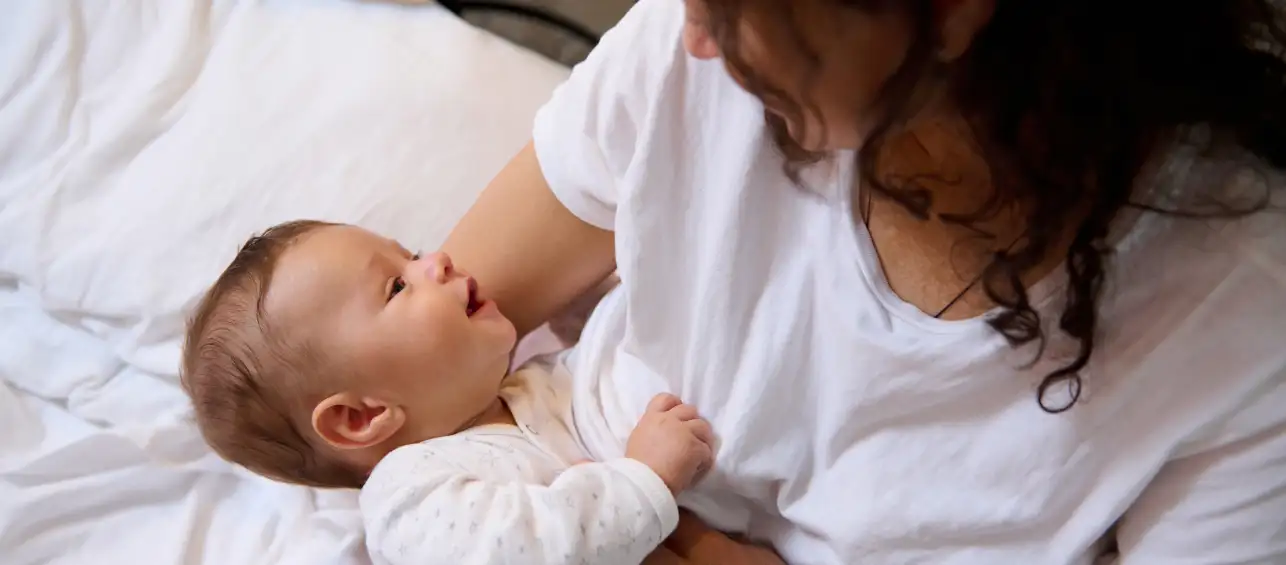Whether this is your first time breastfeeding or you’ve breastfed before, you may be surprised to learn that some of the things you thought about breast milk supply aren’t true.
I’d like to help clear up some common myths about breast milk supply. Learning the facts can help you understand changes in your body during pregnancy and what to expect as you begin breastfeeding your baby.
Myth #1: Breast milk begins to be produced once your baby is born.
Fact: The production of breast milk actually starts well before you deliver your baby.
Colostrum is a thick, yellowish fluid that is the first food your baby receives from you. It starts being produced at 16 weeks of pregnancy and is often the cause for breast tenderness.
Colostrum is packed full of calcium, potassium, proteins, minerals, and antibodies your baby needs in those first few days.
Between 2 and 4 days after delivery, your body will start to produce milk in larger amounts. This can make your breasts feel full. It’s at this time that your milk is said to have “come in.”
Important to know: Colostrum rarely leaks out of the breasts during pregnancy.
Myth #2: Babies will be ready to eat a lot right after birth.
Fact: Your body is not supposed to make a large amount of milk in the first few days.
Human babies have tiny stomachs when they are born, fitting up to just 2 teaspoons per feeding in their tummies. While infants may be ready to eat often after birth, they will not be ready to take in large amounts. This means your body won’t be making large amounts of milk for those first few days.
Babies are learning how to suck, swallow and breathe at this time — something they have never had to do before. The small amounts of colostrum they receive right after birth are perfect for this transition to out-of-the-womb life.
Important to know: Latching well and feeding effectively take practice, both individually and then bringing it together.
Myth #3: Having an oversupply of breast milk is to be expected.
Fact: Your body is designed to supply what your baby asks for.
Many parents see social media posts with photos of deep freezers full of expressed milk and think this is normal. This couldn’t be further from the truth! You are set up to supply what your baby asks for, not for feeding the whole neighborhood.
An oversupply of milk is frequently seen as your milk more fully comes in, around day 3 or 4 after delivery. This should reduce as your baby feeds and leaves behind what they don’t need, allowing your body to know how much to make.
If your baby wants more milk to be produced, they will feed more frequently for a day or two, then settle back into their usual pattern (if there is one yet!).
Important to know: An oversupply of breast milk can lead to swollen breasts, called engorgement. Learn how to manage engorgement.
When to Call the Doctor About Breast Milk Supply
Call your baby’s primary care provider and/or a lactation consultant for guidance if:
- You are worried that more frequent feeding is a problem
- Your baby is having less than expected diapers
- Your breasts are engorged and you’re having trouble resolving the problem
- You notice anything else that is concerning to you related to feeding your baby
Even though breastfeeding is natural, it is also learned. As you and your baby gain skills, you will also gain confidence. It is a lot like dancing with a partner — you each have to learn your own steps and then bring those steps together. There will be a few times that you step on each other’s toes as you learn!
Further Reading
Everyone’s journey with infant feeding and milk supply is different. Fortunately, there are many resources for getting help. These Breastfeeding Resources for Patients and Families from the Cincinnati Children’s Center for Breastfeeding Medicine offer a wide variety of topics on both breastfeeding and breast milk supply. We wish you well as you get started on your journey!
Author’s Note: Although I use terms such as breast, breastfeeding, breast milk, and mother, I acknowledge some parents may not identify or be comfortable with these terms. At Cincinnati Children’s, we support all lactating families.
For breastfeeding questions, information about services, or to schedule an appointment in the Breastfeeding Medicine Clinic, please call the Center for Breastfeeding Medicine at 513-636-2326.






